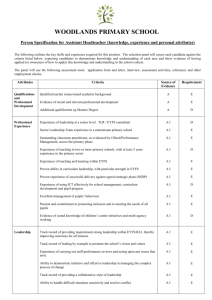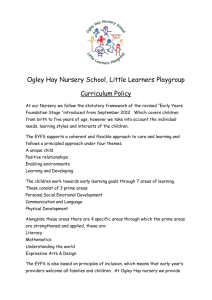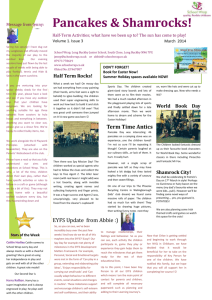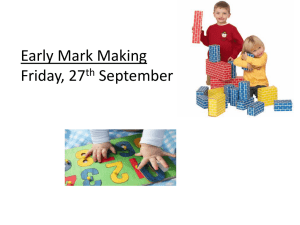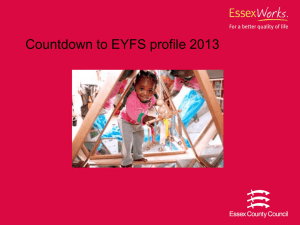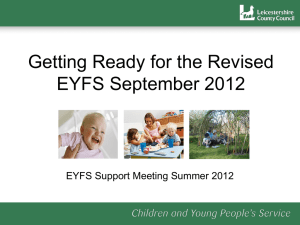Policy summary: Play provision, the Early Years Foundation Stage
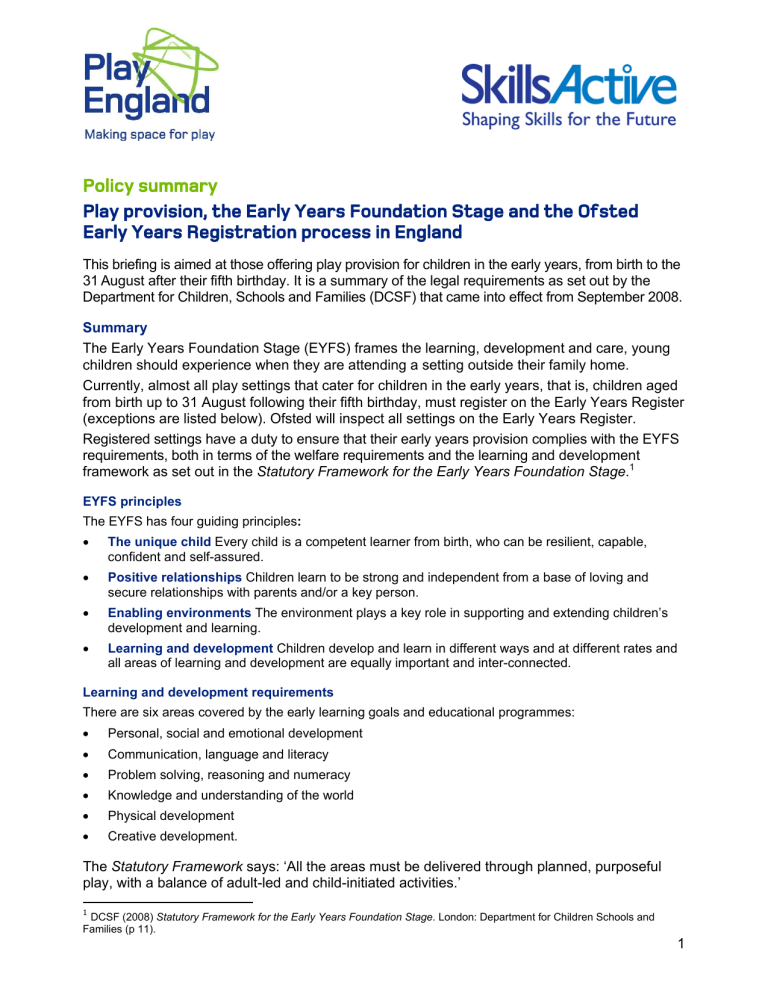
Policy summary
Play provision, the Early Years Foundation Stage and the Ofsted
Early Years Registration process in England
This briefing is aimed at those offering play provision for children in the early years, from birth to the
31 August after their fifth birthday. It is a summary of the legal requirements as set out by the
Department for Children, Schools and Families (DCSF) that came into effect from September 2008.
Summary
The Early Years Foundation Stage (EYFS) frames the learning, development and care, young children should experience when they are attending a setting outside their family home.
Currently, almost all play settings that cater for children in the early years, that is, children aged from birth up to 31 August following their fifth birthday, must register on the Early Years Register
(exceptions are listed below). Ofsted will inspect all settings on the Early Years Register.
Registered settings have a duty to ensure that their early years provision complies with the EYFS requirements, both in terms of the welfare requirements and the learning and development framework as set out in the Statutory Framework for the Early Years Foundation Stage .
1
EYFS principles
The EYFS has four guiding principles :
The unique child Every child is a competent learner from birth, who can be resilient, capable, confident and self-assured.
Positive relationships Children learn to be strong and independent from a base of loving and secure relationships with parents and/or a key person.
Enabling environments The environment plays a key role in supporting and extending children’s development and learning.
Learning and development Children develop and learn in different ways and at different rates and all areas of learning and development are equally important and inter-connected.
Learning and development requirements
There are six areas covered by the early learning goals and educational programmes:
Personal, social and emotional development
Communication, language and literacy
Problem solving, reasoning and numeracy
Knowledge and understanding of the world
Physical development
Creative development.
The Statutory Framework says: ‘All the areas must be delivered through planned, purposeful play, with a balance of adult-led and child-initiated activities.’
1
DCSF (2008) Statutory Framework for the Early Years Foundation Stage . London: Department for Children Schools and
Families (p 11).
1
Settings need to provide individualised opportunities based on each child’s needs, particularly those related to ethnicity, language and disability.
Note: non-primary childcare providers, which will include many play settings, are not required to formally teach reading and writing, but should provide opportunities for children to choose to engage in pre-literacy activities.
Welfare requirements
All providers must adhere to the welfare requirements including:
Safeguarding and promoting children's welfare, including registering all children in this age group that use the setting, ensuring they do not leave the setting unaccompanied and promoting their health and well-being needs
Having suitable people, with appropriate qualifications, training, skills and knowledge and with appropriate adult/child ratios
Having suitable premises, environment and equipment, including access to outdoor space
(or taking children outdoors regularly)
Having systems and plans to ensure that every child receives an enjoyable and challenging learning and development experience that is tailored to meet their individual needs.
Maintaining documentation, including records, policies and procedures required for the safe and efficient management of the settings and to meet the needs of the children.
For further information please refer to: www.standards.dfes.gov.uk/eyfs/site/requirements/index.htm
For qualifications requirements please go to: www.cwdcouncil.org.uk/qualifications-list
General requirements
All settings must make ongoing observations on children in the early years age group.
Observations should not be intrusive, and recordings of these need not be time consuming.
Play settings should share significant observations about a child with their parents and other settings the child attends.
Exemption from the learning and development requirements
All early years providers, regardless of type, size or funding of the setting must deliver, by law, the EYFS requirements. Settings may apply for exemption from the learning and development requirements.
Exemption from delivering the learning and development requirements will be granted only in exceptional circumstances where a majority of parents agree with the provider that an exemption should be sought.
For further information please refer to www.standards.dfes.gov.uk/eyfs/site/requirements/exemptions.htm
Settings which do not have to register on the Early Years Register
According to the Statutory Framework for the Early Years Foundation Stage, a setting does not need to register if it:
Cares for children aged three and over for two hours or less each day even if the provision is open for longer than this period.
Intends to offer care for the early years age group on particular premises for 14 days or less in any period of 12 months (but you must notify Ofsted in writing at least 14 days before you start providing care on those premises).
2
Provides no more than two types of activity from the following list and any care provided is incidental to the activity and is not the main focus of your provision:
school study support or homework support
sport
performing arts
arts and crafts
religious, cultural or language study.
The Childcare Register
Settings that offer play provision to children from 1 September following their fifth birthday to eight years old must register separately onto the childcare register (this is free if done at the same time)
The same exceptions, listed above, apply to the childcare register
Open access settings, where children are free to come and go, do not have to register
Settings that are exempt may wish to register on the voluntary part of the Childcare Register to show that it meets the welfare requirements.
Settings on the childcare register may be inspected, but the inspection will only look at the welfare requirements as outlined in the registration process.
Further Information
Your local authority will run training or be able to signpost you to more information locally.
For help as to whether you are exempt you can call Ofsted’s helpline on: 08456 404040
For further information please refer to: www.standards.dfes.gov.uk/eyfs/ www.ofsted.gov.uk/Ofsted-home/Forms-and-guidance/Browse-all-by/Care-and-localservices/Childcare www.skillsactive.com/playwork/early-years-foundation-stage www.playengland.org.uk
A more detailed briefing on play provision and the Early Years Foundation Stage is being developed in consultation with DCSF and other key stakeholders.
If you would like further information about the EYFS and play, please contact:
Play England
Lisa Davis, Policy Officer playpolicy@ncb.org.uk
Published for Play England by NCB May 2009
SkillsActive
Chris Martin, National Programme Manager chris.martin@skillsactive.com
Play England
London 7QE
Tel 020 7843 6300
Email playengland@ncb.org.uk www.playengland.org.uk
3

